When Myanmar’s junta leader ordered the creation of a new soccer league two years ago — apparently after ruling out a bid for Manchester United — he harked back to the country’s glory days.
However, despite a successful start, the nation’s Premier League is struggling to lure supporters who are used to watching -multimillion--dollar players from the big European clubs.
In a half-deserted Yangon stadium recently, a handful of Manaw Myay FC fans — almost outnumbered by armed police — could barely contain their anger at their club’s poor performance.
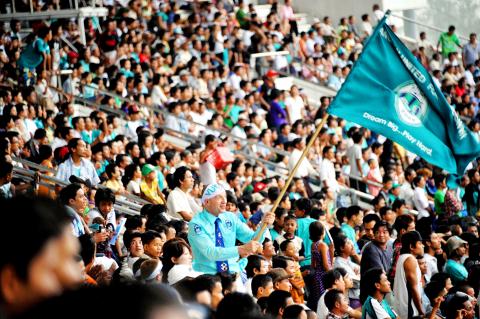
Photo: AFP
“Mothers go home!” one fan shouted at his team as they trudged off the pitch after the 7-2 thrashing by Naypyidaw FC.
“In 2009, there were big crowds, now it’s half,” one league club manager who did not want to be named said.
“There are maybe five or 10 good players in Myanmar,” he said, adding that new investment in training facilities and relatively high player salaries would take time to translate into better performance on the pitch.
In addition, most games are played in the capital, far from the home states of many of the new teams.
Poverty, poor transport infrastructure and travel restrictions — imposed after decades of civil war between the government and ethnic minority rebels — mean fans cannot move freely around the country to watch games.
Four decades ago Myanmar, formerly known as Burma, was a major soccer force in the region, winning five South East Asian Games between 1965 and 1973.
Since then, the national team has suffered a precipitous decline as the military dictatorship laid waste to the economy.
After almost half a century of military rule, the country is ranked 167th by the world soccer body FIFA, three places below Afghanistan.
“The national team lose every match, they are not interesting ... Even in 10 years, we will not be the same level as in the past,” said the manager, who has worked in the game for 20 years.
Andrew Marshall, author of The Trouser People, a book about politics and soccer in Myanmar, said the country did well before because “it didn’t have this poverty, this great weight of being a dictatorship on its shoulders.”
Across society, “the best people don’t rise to the top because it’s a corrupt and inequitable system,” he said.
“I do see football as being quite symbolic of a country where they have an enormous amount of talent, usefulness that is never harnessed,” he said.
Several clubs are controlled by notorious regime cronies targeted by Western sanctions, including Yangon United owner and alleged arms dealer Tay Za and Magway’s Steven Law, who is accused of links to drug trafficking.
The taint of corruption has cast a shadow over FIFA’s efforts to provide training that would bridge the gap between the vibrant grassroots game and the professional sport.
Following a visit by FIFA -president Sepp Blatter in March, the organization had to fend off allegations that it breached sanctions rules by paying grants through a banned company.
The soccer body, currently facing a slew of unrelated corruption scandals, has denied the claims.
Myanmar’s league was the -brainchild of senior general Than Shwe, who held the impoverished country in an iron grip until controversial elections heralded the arrival of a nominally civilian parliament in March.
It was the next best thing to buying his favorite team — Manchester United — after he decided a billion US dollar bid for the English club “could look bad,” according to leaked US diplomatic notes from June 2009.
Unfettered by transparency requirements, the junta leader simply ordered a group of cronies and businessmen to found — and fund — the professional soccer teams, possibly to distract attention from the country’s political and economic problems, the US cable said.
Businessmen were said to have been lured by incentives from the regime, including construction contracts, new gem and jade mines and the opportunity to use club sponsorship as a platform to advertise their companies.
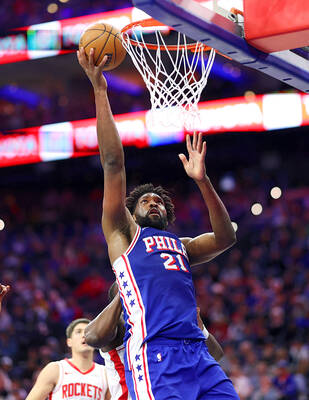
The Philadelphia 76ers, fueled by 36 points from Tyrese Maxey and a triple-double from Joel Embiid, on Thursday beat the Houston Rockets 128-122 in an NBA overtime thriller. Cameroonian big man Embiid scored 32 points, grabbed 15 rebounds and handed out 10 assists, posting the ninth triple-double of his career to help the Sixers end the Rockets’ three-game winning streak. Rockets star Kevin Durant scored 36 points and Amen Thompson added 17, but Thompson was scoreless in the fourth quarter. Even so, the Rockets led by nine midway through the final frame, Maxey tying it at 115-115 with 40.1 seconds left. Durant missed a
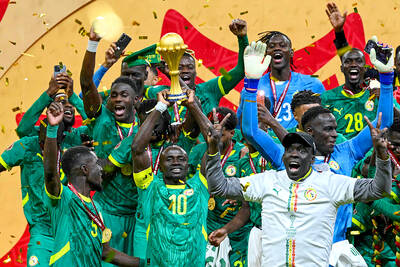
MARRED FINAL: As most of Senegalese players walked off the pitch after a controversial decision, some supporters threw objects and attempted to get onto the pitch Senegal on Sunday won the Africa Cup of Nations (AFCON) as Pape Gueye’s extra-time winner sunk hosts Morocco 1-0 after a chaotic final that saw the eventual champions storm off the pitch late in the game. Brahim Diaz could have won the trophy for Morocco with a controversial spot-kick in the 24th minute of added time at the end of normal time as ugly scenes broke out in the stands. However, Senegal goalkeeper Edouard Mendy easily saved the weak attempted “Panenka” chip by the Real Madrid winger, who was clearly distracted by the long delay that followed the penalty award.
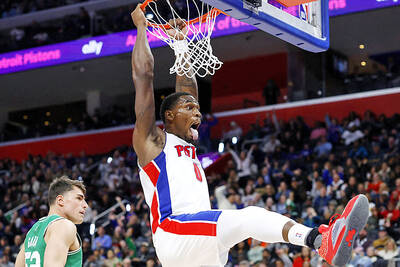
Tobias Harris on Monday scored 25 points as the Detroit Pistons held off the Boston Celtics to score a 104-103 victory in their top-of-the-table Eastern Conference showdown. Harris was one of four Detroit players to finish in double figures, with Jalen Duren adding 18 points and point guard Cade Cunningham scoring 16 points with 14 assists. The win sees Detroit extend their lead at the top of the Eastern Conference to 31-10, 5.5 games ahead of second-placed Boston, who fell to 26-16 with the defeat. Jaylen Brown led the Celtics scoring with 32 points and almost snatched victory in the
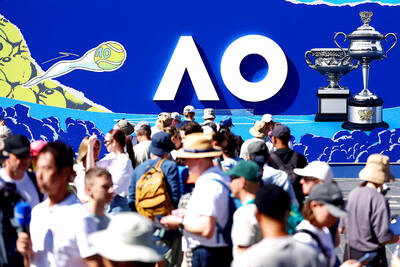
The civil war engulfing tennis has been laid bare on the opening day of the first Grand Slam event this year, with details of Tennis Australia’s peace deal with the Professional Tennis Players’ Association (PTPA) published for the first time. The PTPA last year launched an anti-trust lawsuit against the four grand slam tournaments, the ATP Tour, WTA Tour, and the International Tennis Federation, accusing them of collaborating to reduce prize money, impose a restrictive ranking system and repress player promotional opportunities, but Tennis Australia was dropped from the claim last month after reaching a settlement agreement with the players’